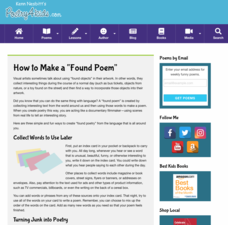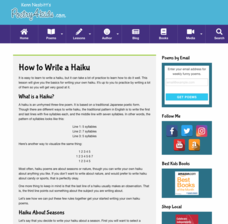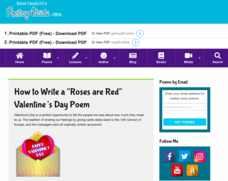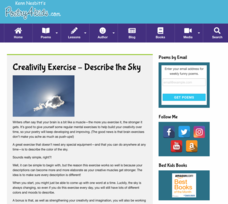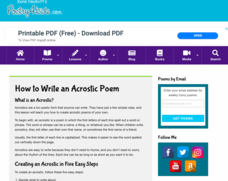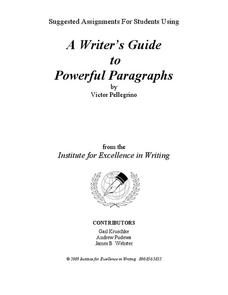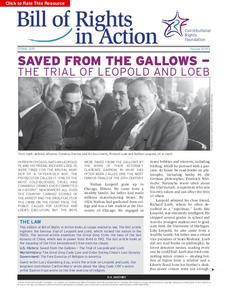Poetry4kids
Evoking the Senses in a Poem
Budding poets choose a topic for a sensory-filled poem. Authors describe that topic using detailed language based on the five senses. Then, switch the senses to create a fanciful poem intended to add a touch of fun to the objective.
Poetry4kids
How to Write an Apology Poem
Put a silly spin on making amends with an apology poem. Budding poets think of a time they were made to apologize although they didn't mean it. They then turn their experience into a poem that offers details and ends with an explanation...
Poetry4kids
How to Create Book Spine Poetry
Can you create a poem without writing a word! With found poetry, you can! Practice one version of found poetry with a lesson on book spine poems. Learners create poems by stacking books and reading the lines created by their spine titles.
Poetry4kids
How to Write a Limerick
Add a little fun and fancy to English language arts with an activity that challenges scholars to write a limerick. Authors follow five rules in order to compose an original poem that contains a specific rhyme scheme.
Poetry4kids
How to Create a “Found Poem”
Writers compose an original found poem by searching for words that inspire them. Words are taken from everyday conversation, books, cut from magazines, the mail, or an already written poem.
Poetry4kids
How to Write a Haiku
A haiku is the focus of an activity that challenges scholars to draft an original poem. Authors discover the origin and components of a haiku, read three example poems, then follow six steps to compose their own.
Poetry4kids
How to Write a Concrete or “Shape” Poem
Writers compose an original shape poem. Scholars choose a subject to write about and create a visual representation by forming a corresponding picture using the poem's words.
Poetry4kids
How to Write a “Roses are Red” Valentine’s Day Poem
Compose a Valentine's Day poem! Practicing their rhyming skills, scholars follow the traditional format to create a happy poem for a friend or family member.
Poetry4kids
How to Start a Poetry Journal
Practice makes proficient! Using a journal of their choice, authors organize pages, then begin their writing journey of on-going writing practice in which they compose all poetic forms including diamante, limerick, free verse, and more!
Poetry4kids
How to Write a Free Verse Poem
Budding poets compose an original free verse poem. Encouraged to use personification and alliteration, scholars read over three tips and examples then try their hand at drafting a poem of their own style.
Poetry4kids
Twenty Fun Writing Prompts for Kids
Twenty prompts reinforce scholars' writing skills of essays and poems. Prompts cover topics such as superpowers, holidays, the weather, and more!
Poetry4kids
Creativity Exercise - Describe the Sky
Scholars stretch their writing muscles with an exercise that asks them to describe the sky using similes and metaphors.
Poetry4kids
How to Write an Alliteration Poem
Learners follow five steps to compose an alliteration poem. They choose one consonant and brainstorm as many nouns, verbs, and adjectives they can think of to create rhyming sentences that come together in a poetic fashion.
Poetry4kids
How to Write an Acrostic Poem
Acrostic poems are perfect for any topic! A quick tutorial guides learners into writing acrostic poems with the basics and key examples.
Institute for Excellence in Writing
A Writer’s Guide to Powerful Paragraphs
When it comes to teaching writing, it helps to start small. A supplementary guide to A Writer's Guide to Powerful Paragraphs provides suggested activities to help writers craft a variety of paragraphs. Each assignment covers a specific...
Prestwick House
Wuthering Heights
How many ways can you break down a classic novel? Based on the acclaimed Romantic-period novel by Emily Bronte, the Wuthering Heights activity pack includes a pre-reading exercise. Next, learners create a resume for one of the...
Curated OER
30 Writing Prompts for National Poetry Month
A collection of writing prompts are so fun, you'll want to finish them yourself! Learners practice narrative prose and poetry skills with prompts that twist traditional structure, provide wild vocabulary, and encourage pupils to...
Birmingham City Schools
Stick to the Point: Getting It Right with Constructed Responses
Practice writing constructed responses with a 26-slide presentation. Developed to guide scholars through the appropriate steps, the resource assists them in providing a well-considered answer.
Constitutional Rights Foundation
Puritan Massachusetts: Theocracy or Democracy?
Was Puritan society governed as more of a theocracy or democracy? After comparing and contrasting a series of primary source documents, middle and high schoolers form small groups and debate the question.
Constitutional Rights Foundation
Saved from the Gallows — the Trial of Leopold and Loeb
Was justice served for Bobby Franks? An informative article about the 1924 trial of Richard Loeb and Nathan Leopold includes an overview of the murder of Bobby Franks, the defense’s legal strategy, and excerpts of closing arguments from...
Constitutional Rights Foundation
The Cold War: How Did It Start? How Did It End?
What is the difference between a Cold War and a Hot War? Scholars research the beginning of the Cold War. They analyze diary entries as well as excerpts from various events during the 45-year standoff. To finish, they prepare final...
Constitutional Rights Foundation
Rachel Carson and the Modern Environmental Movement
Scholars analyze the environmental movement started in the 1960s. Through excerpts from Rachel Carson's books as well as diary entries, they take a look at the reason for the modern movement to save the planet and then create final...
Constitutional Rights Foundation
Conservation, Preservation, and the National Parks
Going green? Scholars investigate the creation of the US National Park program. Through diary entries as well as expert testimony, they synthesize information and analyze the need for conservation and preservation. Finally, they display...
Peter Bunzl
Cogheart and Moonlocket
Peter Bunzi takes readers to the Victorian era with two stories, Coghaert and Moonlocket. Accompany the literary time warp with a companion packet that offers a plethora of exercises. Learning opportunities include activities for before,...






